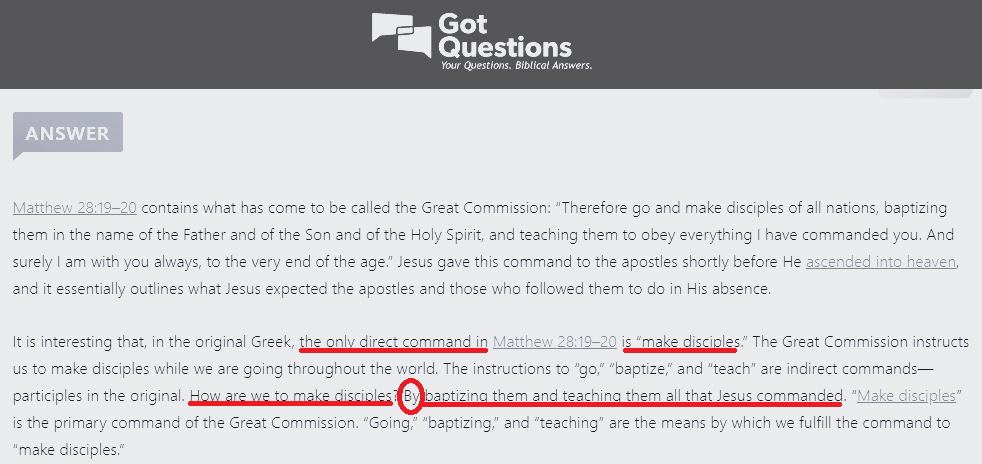Baptism
(and genuine salvation)
I read a tract (a little snippet or booklet that reaches the lost with the Gospel) recently, and one of the footnotes on that tract looked to be handwritten from a person which said, “Baptism confuses me.”
Many, MANY people are terribly confused about baptism. So, what exactly are we supposed to do? In order to answer this, we—of course—turn to God’s Word.
So, what exactly are we supposed to do?
First of all, let’s be clear. Baptism is commanded by Jesus Christ:
“Go therefore and make disciples of all nations, baptizing them in the name of the Father and of the Son and of the Holy Spirit.”
“And he said to them, ‘Go into all the world and proclaim the gospel to the whole creation. Whoever believes and is baptized will be saved, but whoever does not believe will be condemned.’”
It is also commanded and carried out (as necessary to receive the Holy Spirit and salvation) through the third person of God, the Holy Spirit, using the disciples as conduits—found in numerous places in the book of Acts and beyond:
“And Peter said to them, ‘Repent and be baptized every one of you in the name of Jesus Christ for the forgiveness of your sins, and you will receive the gift of the Holy Spirit.'”
As if these commands from the Lord is not enough to understand baptism as a crucial part of salvation, we continue.
Many cherry-pick several verses in the New Testament which mention confession of faith and claim that is all that is necessary. Romans 10:9 is one example.
“…if you confess with your mouth that Jesus is Lord and believe in your heart that God raised him from the dead, you will be saved.”
They believe that a prayer or confession is all that is needed for salvation, and that baptism is simply an outward symbolic event/sign for an inward conversion—or the like. But the many that understand this erroneously as truth are really not taking the Bible in full context. In other words, they aren’t seeing the bigger picture. In order to do this, we must be aware of a few things.
they aren’t seeing
the bigger picture.
One important thing to remember is that things differ a bit between the time before/during Jesus’ walk on earth and how it is today (after death, resurrection, and ascension -the ultimate sacrifice for sin completed). The Old Covenant vs. The New Covenant. While Jesus was on earth, we know that John baptized with water for repentance, but after Jesus’ sacrifice and victory in resurrection (what commenced The New Covenant), we are told to baptize with the Holy Spirit/to receive the Holy Spirit. (Acts 1:5; Acts 19:1-5) This is still full, total-body, buried-in-water baptism (modeled by Jesus in Matthew 3:16; Mark 1:10). We “die” in buried baptism with/like Jesus (to our old self) and are “resurrected” in a new body—a new, saved, transformed (by the Spirit) creation. Water baptism and baptism by the Holy Spirit are one in the same, commencing in Acts, which is what is told in Ephesians 4:5—this Scripture makes it clear there are not multiple baptisms, but they are joined in one act.
Now, please understand, there is no salvific value about the water itself at baptism—the water isn’t some literal enchanted pool of transformation, leading one to be “magically” saved. But the genuine motive and obedience in faith at the heart level to do the aforementioned—die to self and be raised anew in Christ just as it has been commanded- is the necessity, and that obedience is carried out in the act of water baptism.
*We see this example with the false conversion of Simon in Acts 8:13. He “believed” and was baptized, but, as Peter clarifies in Acts 8:21, his heart wasn’t right. So, he went through the motions, believing and being baptized, but when the motive isn’t genuine, there is false conversion, and baptism means nothing.
With the above stated, baptism can occur in any body of water at any consciously-aware time in life (a time when one can fulfill belief, confession, and repentance by their own volition, being cognitive of their sinful state and able to personally accept the Gospel – so infant baptism isn’t Biblical baptism).
Also, Paul’s letters addressed the wrongful Jewish ways of “righteousness” by works and corrected with the need for faith to obtain righteousness. These “works” entailed Old Testament (OT) customs and laws that the Jews followed (most notably is that of circumcision). So when we are told that we are saved by faith and not by works, that doesn’t include the command of after-Christ’s-sacrifice, New Covenant, Christian baptism. In my studies, I am of the persuasion that baptism is a fundamental element of that faith, not a “work” in and of itself. There is nothing I have found that contradicts the fact that “faith” (pistis in Greek: means “conviction of the truth of anything; belief; assurance; fidelity; moral conviction” [Blue Letter Bible]) in Christ includes all the necessary steps that Jesus and the Holy Spirit has commanded: confession (genuine belief that Jesus is Lord, Son of God), repentance, AND baptism. In fact, Scripture actually supports baptism as part of faith. I am of the persuasion (after finding supporting evidence of the three as necessary for salvation in such aforementioned verses [confirmed in my next paragraph]) that all work hand-in-hand in an all-encompassing faith and toward salvation. When reading Paul’s letters this fact will be clarified a bit more (that he is addressing Jewish OT customs as “works”).
Baptism is a fundamental element of faith, not a ‘work’ in and of itself.
Finally, Scripture notes confirm that verses about confession and faith—such as the one mentioned above found in Romans 10:9—were used together with baptism by the earliest (in the time of Paul) Christians and should continue today, because “those who are regenerated by the Holy Spirit (following baptism),….are the only ones who can confess from the heart, ‘Jesus is Lord’ (based on 1 Corinthians 12:3 – TNIV Study Bible, 2006).“
Here are some added passages of Scripture that speak of baptism for salvation/cleansing of sin, direct correlation between faith and baptism, and some that speak of “works” as Old Testament law/circumcision (not baptism, again, as baptism is not a work). Galatians 2:15-21 (Works is OT, does not include baptism); Galatians 3:26-27 (Baptism as part of faith, again, works as OT law); Colossians 2:12 (Baptism as part of faith, "part of" as in go together hand-in-hand); Acts 8:36-39 (The eunuch baptized as part of belief/faith for salvation); Acts 18:8 (baptism shared along with belief for salvation); Acts 19:5 (baptism before receiving the Holy Spirit - salvation); Acts 22:16 (baptism for the cleansing of sin - which must be done to be saved); Titus 3:5 (washing refers to baptism, cleansing of sin through rebirth/renewal, this full passage also directly correlated this with justification by grace); Hebrews 10:22 (washing through Christian baptism, again, this particular passage refers to persevering in faith - so directly correlating baptism with faith); 1 Peter 3: 20-21 (baptism that saves, through obedience of being resurrected with Christ); Ephesians 4:5 (ONE - combining Lord, faith, baptism, body, Spirit, God and Father as ONE).
Another Scripture that individuals point out when arguing against baptism as a necessary step for salvation is 1 Corinthians 1:14&17. Here, Paul states,
“I thank God that I baptized none of you except Crispus and Gaius”
And he goes on to state in vs. 17,
“For Christ did not send me to baptize but to preach the gospel, and not with words of eloquent wisdom, lest the cross of Christ be emptied of its power.”
They argue that if baptism was necessary for salvation, why would Paul state this? Their argument is — “It’s like Paul is saying, ‘I am thankful that you were not saved.’ If baptism was necessary for salvation, why didn’t he baptize them?” However, they are cherry-picking this verse, as so many tend to do. Like the other examples mentioned above, they aren’t taking the chapter into full, proper context. If we look at this passage in full, we will see that those in Corinth were divided over leaders. There was division and not unity within this particular church. They weren’t following Christ fully, but were looking to others, following others such as Apollos, Cephas, and Paul, and not solely following Christ as they should. So, Paul was simply saying he is glad he *himself* wasn’t the one to baptize them—but that someone else did—or else they’d have an even greater reason to follow Paul over Christ. He was simply not wanting to lead them further astray in their misdirection. It was the fact that he was sent specifically, his specific role, to preach Christ’s Gospel. It wasn’t necessarily his role/job to baptize them and finish out their conversion himself, their rebirth, but just to deliver the message, teach them about Christ at that moment.
We must be incredibly careful about building our entire doctrine on one premise. Instead, we need to look at Scripture as a whole, taking into account every passage about baptism and faith and salvation.
I like what Michael Shank adds from his book Muscle and a Shovel.
If we are not baptized we are not:
- Put into Jesus Christ (Gal. 3:26-27)
- Added to His body, the church (Acts 2:47; Col. 1:18)
- Into His death (Rom. 6:3)
- Buried with Him (Rom. 6:4)
- Planted up in the likeness of His death (Rom. 6:5)
- Raised up in the likeness of His resurrection (Rom. 6:5)
- Raised to walk in newness of life (Rom. 6:4)
- Obeying the gospel of Jesus Christ (2Thes. 1:6-10)
- Forgiven of past sins (Acts 22:16)
- Safe in the saving ark which is Jesus Christ (Eph. 5:23-25; Acts 2:47) (p. 267)
Some dear friends of mine,
evangelical missionaries with Mercy Partners,
offer some great insight about baptism as well.
Check them out by clicking on the photo:

Following Jesus’s command to make disciples *by* baptizing and teaching, we have to pose the question, “Can we say we are saved if we are not a disciple?”
Looking at other passages of Scripture, we can also ask, “Can we say we are saved if we are not filled with His Holy Spirit? Can we say we are saved if our sins have not been forgiven and washed away?” (Acts 2:38/ Acts 22:16/ 1 Peter 3:21)
Addendum:
After more study, I’ve broken it down a little more, and I wrote this response on a social media post—
It is to my knowledge, by careful study of the Word, that to be saved one must put on (be clothed with) Christ (the blood sacrifice made to atone for —cover [like clothing]— our sinfulness.) Some, like Ray Comfort, have likened it (putting on Christ) to putting on a parachute (only when you put it [Jesus] on will it save). To be in Christ, clothing ourselves with Christ (Galatians 3:27) would follow belief, confession, and repentance by the manner of baptism. We die with Christ and are raised to *new* life (if you’re not in new life, reborn, you’re not changed, thus not saved).
When asked what must be done (to be saved), the Holy Spirit Himself said (using Peter as a conduit) to Repent and be baptized for the forgiveness of sin (necessary for salvation, reconciliation between sinful man and perfect God) and the gift of the Holy Spirit.
This was AFTER the ultimate blood sacrifice, the penalty paid, was complete, so the example of the thief on the cross doesn’t apply to the salvation plan of today (after “It is finished“).
I beseech everyone to thoroughly tackle the study, especially when considering not causing others to stumble.
I highly urge reading Jack Cottrell’s Baptism—A Biblical Study
It’s important to note as you study this subject that so many Christians try to argue against baptism, not because there’s a lack of Biblical support (because, as I’ve just offered above, Scripture actually backs baptism for salvation), but because people like Huldrych Zwingli (born January 1, 1484, and a prominent figure in Reformation) claimed it wasn’t necessary for salvation. And although I use Got Questions frequently (because they do offer some great truths, but some is false understanding—again, the meat and bones thing), they are heavily influenced by Calvinism (Reformed), and even they contradict themselves.
For instance, they claim baptism doesn’t save.
*Something I pointed out above is if you are not saved, you cannot be a disciple of Christ, and you cannot be a disciple of Christ if you are not saved; the two are synonymous.
Yet, here is what Got Questions has to say about making disciples and baptism—

Also, many people (like Got Questions) like to support the idea that the thief on the cross wasn’t able to be baptized, so since he was saved simply with his belief, so we are today. But as I said earlier, this was before “It is finished.” Before the ultimate price was paid and The New Covenant Began.
*And we are not told anything about the thief’s background, his history. He could have already participated in John’s baptism prior to his crucifixion. But all this, his story, is speculative (on both sides of the argument), and we cannot read into Scripture what’s not there.
Again, they contradict themselves.


Pray over this. Read and study Scripture. And do all without presuppositions. Without bias, but with proper exegesis. Pray first, then read by the Holy Spirit and His illumination of truth. I implore you!
ALSO CHECK OUT:
The Encouragement Blog Entry: Baptized
The Encouragement Blog Entry: Works
References:
Mercy Partners® is a registered trademark, and logo and likeness is used by limited permission by Jennifer with Lights in the Darkness. Mercy Partners® and Michael Shank Ministries do not sponsor or endorse Lights in the Darkness and its contents.
References
Blue Letter Bible. Retrieved February 4, 2021, from https://www.blueletterbible.org/lang/lexicon/lexicon.cfm?Strongs=G4102&t=ESV
Today’s New International Version Bible. (2006). Zondervan
All Scripture (unless otherwise noted): English Standard Version Bible. 2021. BibleHub.com and
English Standard Version Bible. 2016. Crossway
Shank, Michael. “Muscle and a Shovel.” Michael Shank Ministries. 2011
Kilian, T. Truly Born Again. https://www.mercy-partners.org/
Got Questions. 2022. What is the Great Commission? Retrieved from What is the Great Commission? | GotQuestions.org
Got Questions. 2022. What is the New Covenant? Retrieved from What is the New Covenant? | GotQuestions.org
Got Questions. 2022. What is the difference between priests and Levites? Retrieved from What is the difference between priests and Levites? | GotQuestions.org

